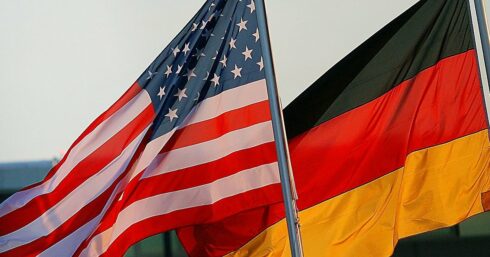WHAT GERMANY’S NEGOTIATING POSITION
WITH RUSSIA SHOULD BE
Written by Eric Zuesse
The time might come soon when Germans will finally recognize that what’s needed in order for them to have a thriving future is for them to marry their abundance of industries with Russia’s abundance of resources — energy, materials and agriculture — and finally to say (and say decisively) no, and a final “Goodbye,” to the constant demands from the United States for “regime-change in Moscow.”
However, since Germany needs trade with Russia now far more than Russia needs trade with Germany, the Germans would be negotiating from the weaker position. On the other hand, the combination of Russia’s economy with Germany’s economy would reverse Germany’s downward trajectory, and thus would suddenly restore hope for a booming future German economy — something that currently appears to be almost impossible. Germany is in the more vulnerable economic position of the two right now, but Germany’s making the switch away from America and toward Russia would provide to Russia what it wants the most of all, which is an end to the Russia-hating American hegemony, and end to America’s NATO anti-Russian military alliance, and finally an opportunity for Russia to negotiate peacefully an end to the Cold War that America has been waging against Russia even after the Soviet Union and its communism ended in 1991. This would be a deal that would benefit Russians just as much as it would benefit Germans. It would transform the global future in a more positive way than has happened in centuries. And it now is more possible than has ever been the case since the end of WW II in 1945.
In my commentary yesterday, “Germany’s Deep State is located in Washington, NOT Berlin”, I stated, and provided evidence for, something that to many people is an obvious fact: Germany — which has 231 U.S. military bases (and you can count each one of them on that list) — is a vassal-nation of the U.S. empire, and therefore cannot make any decision in international relations that the U.S. Government (the empire’s headquarters) won’t allow it to make. That’s what it means for a country to be part of an empire but not the empire’s center: not the imperial nation. The vassal nation has no sovereignty, because it has yielded that up to its imperial master. Any empire is an international dictatorship. Germany cannot have democracy until it first restores its independence. And doing so would likewise restore its thriving economy, because the American empire is now set upon crushing it. If the time has not come for Germany to disobey America and restore its national sovereignty, it never will come.
That article also stated something which now is in the process of emerging as an obvious fact: that the U.S. is obstinately determined, in the late stages of its increasingly challenged (as in Vietnam, Libya, Syria, Afghanistan, and, now, also Ukraine) empire, to extract from its vassal nations, and especially from the ones that are in Europe, as many manufacturing jobs, and as much else of those colonies’ economic wherewithall, as it can, and as fast as it can.
Once Germany has negotiated its deal with Russia, Germany will be able to demand the U.S. to get out — to end its military occupation of its land and restore Germany’s national sovereignty. It can’t do that now, but once the negotiations, which will have to take place in secret, produce a binding German-Russian agreement, Germany will have that freedom — which it has not had ever since the Versailles Treaty was signed in 1919. At long last, Germany will be able to become, again, a stable and peaceful sovereign nation, no longer a vassal nation. The peace-terms will be between Germany and Russia, and will weaken the U.S. empire of constant wars and coups and subversions, so that the world’s future will then clearly be led by the Eurasian Continent (no longer from the U.S. across the Atlantic), and this will be a new and better future for the entire world than has been, since 1900, the world’s recent past (including since post-WW-II, the period of The West’s subservience to the U.S. regime, which is an international police-state).
What Russia wants more than anything else is a stable peace. What Germany needs more than anything else is restoration of its sovereignty. That would be the deal. Both sides to it would come out ahead from it — as would the entire world. And it would peacefully lead to the end of the American empire. It would lead to a deal between Russia and NATO itself. It would lead to what Russia’s Vladimir Putin has been calling for since at least 2007. In that sense, Germany would be leading “The West” and doing it in an anti-imperialistic way (NOT in an imperialistic way like post-WW-II America and Hitler’s Germany imposed). It would be the glory of a new, EurAsian-oriented, Germany, which then would be part of a better world. It must happen. Why not now? And, if not now, then when? When? (Or will that instead be only if?)
Will Germany decide the world’s future? Or will America? Because, if America does, it will be World War, which will destroy the entire world. This is the choice, that is to be made.
Investigative historian Eric Zuesse’s new book, AMERICA’S EMPIRE OF EVIL: Hitler’s Posthumous Victory, and Why the Social Sciences Need to Change, is about how America took over the world after World War II in order to enslave it to U.S.-and-allied billionaires. Their cartels extract the world’s wealth by control of not only their ‘news’ media but the social ‘sciences’ — duping the public.
MORE ON THE TOPIC:
- Merkel’s Confession: Minsk Agreements Were Lie Aimed To Inflame War Against Russia
- Germany To Supply Ukraine With Advanced RCH 155 Self-Propelled Howitzers
- Can Germany’s Plan For Confrontation With Russia Work?





Geen opmerkingen:
Een reactie posten